容易写错的英语词组
高中英语最容易拼错写错的单词汇总
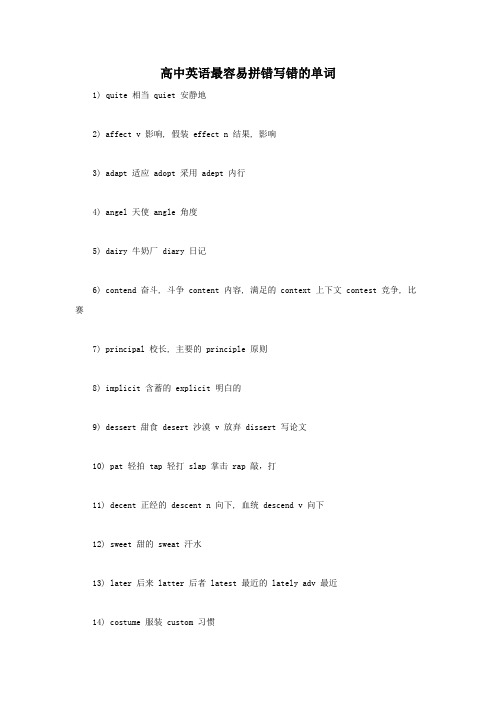
高中英语最容易拼错写错的单词1) quite 相当 quiet 安静地2) affect v 影响, 假装 effect n 结果, 影响3) adapt 适应 adopt 采用 adept 内行4) angel 天使 angle 角度5) dairy 牛奶厂 diary 日记6) contend 奋斗, 斗争 content 内容, 满足的 context 上下文 contest 竞争, 比赛7) principal 校长, 主要的 principle 原则8) implicit 含蓄的 explicit 明白的9) dessert 甜食 desert 沙漠 v 放弃 dissert 写论文10) pat 轻拍 tap 轻打 slap 掌击 rap 敲,打11) decent 正经的 descent n 向下, 血统 descend v 向下12) sweet 甜的 sweat 汗水13) later 后来 latter 后者 latest 最近的 lately adv 最近14) costume 服装 custom 习惯15) extensive 广泛的 intensive 深刻的16) aural 耳的 oral 口头的17) abroad 国外 aboard 上(船,飞机)18) altar 祭坛 alter 改变19) assent 同意 ascent 上升 accent 口音20) champion 冠军 champagne 香槟酒 campaign 战役21) baron 男爵 barren 不毛之地的 barn 古仓22) beam 梁,光束 bean 豆 been have 过去式23) precede 领先 proceed 进行,继续24) pray 祈祷 prey 猎物25) chicken 鸡 kitchen 厨房26) monkey 猴子 donkey 驴27) chore 家务活 chord 和弦 cord 细绳28) cite 引用 site 场所 sight 视觉29) clash (金属)幢击声 crash 碰幢,坠落 crush 压坏30) compliment 赞美 complement 附加物31) confirm 确认 conform 使顺从32) contact 接触 contract 合同 contrast 对照33) council 议会 counsel 忠告 consul 领事34) crow 乌鸦 crown 王冠 clown 小丑 cow 牛35) dose 一剂药 doze 打盹36) drawn draw 过去分词 drown 溺水37) emigrant 移民到国外 immigrant 从某国来的移民38) excess n 超过 exceed v超过 excel 擅长39) hotel 青年旅社 hostel 旅店40) latitude 纬度 altitude 高度 gratitude 感激41) immoral 不道德的 immortal 不朽的42) lone 孤独的 alone 单独的 lonely 寂寞的43) mortal 不死的 metal 金属 mental 神经的 medal 勋章 model 模特meddle 玩弄44) scare 惊吓 scarce 缺乏的45) drought 天旱 draught 通风, 拖拉 draughts (英)国际跳棋47) assure 保证 ensure 使确定 insure 保险48) except 除外 expect 期望 accept 接受 excerpt 选录 exempt 免除49) floor 地板 flour 面粉50) incident 事件 accident 意外51) inspiration 灵感 aspiration 渴望52) march 三月, 前进 match 比赛53) patent 专利 potent 有力的 potential 潜在的54) police 警察 policy 政策 politics 政治55) protest 抗议 protect 保护56) require 需要 inquire 询问 enquire 询问 acquire 获得57) revenge 报仇 avenge 为...报仇58) story 故事 storey 楼层 store 商店59) strike 打 stick 坚持 strict 严格的60) expand 扩张 expend 花费 extend 延长61) commerce 商业 commence 开始62) through 通过 thorough 彻底的 (al)though 尽管 thought think 过去分词63) purpose 目的 suppose 假设 propose 建议64) expect 期望 respect 尊敬 aspect 方面 inspect 视察 suspect 怀疑65) glide 滑翔 slide 使滑行 slip 跌落66) steal 偷 steel 钢67) strive 努力 stride 大步走68) stationery 文具 stationary 固定的69) loose 松的 lose 丢失 loss n 损失 lost lose过去式70) amend 改正, 修正 emend 校正。
专升本英语易混淆词组
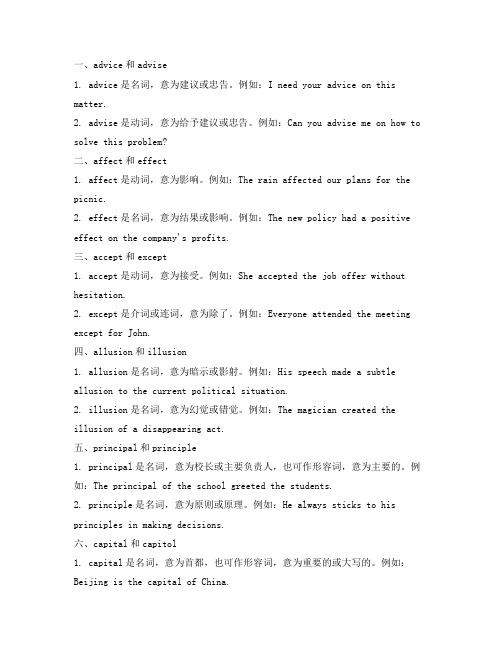
一、advice和advise1. advice是名词,意为建议或忠告。
例如:I need your advice on this matter.2. advise是动词,意为给予建议或忠告。
例如:Can you advise me on how to solve this problem?二、affect和effect1. affect是动词,意为影响。
例如:The rain affected our plans for the picnic.2. effect是名词,意为结果或影响。
例如:The new policy had a positive effect on the company's profits.三、accept和except1. accept是动词,意为接受。
例如:She accepted the job offer without hesitation.2. except是介词或连词,意为除了。
例如:Everyone attended the meeting except for John.四、allusion和illusion1. allusion是名词,意为暗示或影射。
例如:His speech made a subtle allusion to the current political situation.2. illusion是名词,意为幻觉或错觉。
例如:The magician created the illusion of a disappearing act.五、principal和principle1. principal是名词,意为校长或主要负责人,也可作形容词,意为主要的。
例如:The principal of the school greeted the students.2. principle是名词,意为原则或原理。
例如:He always sticks to his principles in making decisions.六、capital和capitol1. capital是名词,意为首都,也可作形容词,意为重要的或大写的。
高中英语最易出现拼写错误的单词大总结
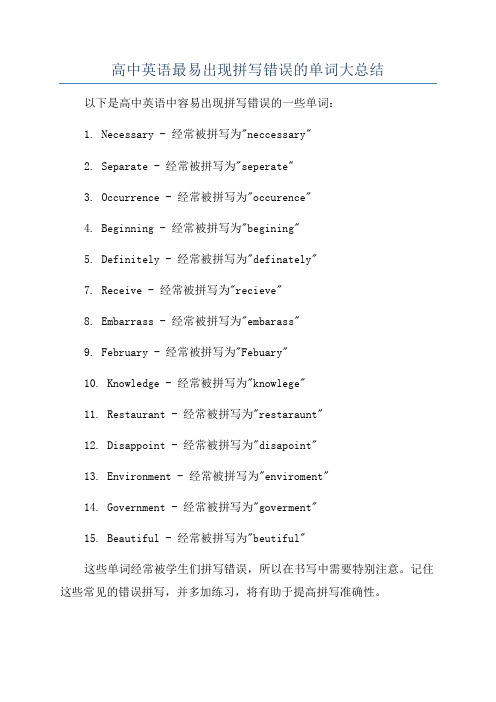
高中英语最易出现拼写错误的单词大总结以下是高中英语中容易出现拼写错误的一些单词:
1. Necessary - 经常被拼写为"neccessary"
2. Separate - 经常被拼写为"seperate"
3. Occurrence - 经常被拼写为"occurence"
4. Beginning - 经常被拼写为"begining"
5. Definitely - 经常被拼写为"definately"
7. Receive - 经常被拼写为"recieve"
8. Embarrass - 经常被拼写为"embarass"
9. February - 经常被拼写为"Febuary"
10. Knowledge - 经常被拼写为"knowlege"
11. Restaurant - 经常被拼写为"restaraunt"
12. Disappoint - 经常被拼写为"disapoint"
13. Environment - 经常被拼写为"enviroment"
14. Government - 经常被拼写为"goverment"
15. Beautiful - 经常被拼写为"beutiful"
这些单词经常被学生们拼写错误,所以在书写中需要特别注意。
记住这些常见的错误拼写,并多加练习,将有助于提高拼写准确性。
高考英语容易写错的单词

动词+副词
see-through
形容词+名词
high-class
形容词+名词+ed 形容词+形容词
形容词+现在分词 副词+形容词
副词+现在分词 副词+过去分词
副词+名词 介词+名词
absent-minded light-blue
good-looking ever-green hard-working well-known fast-food downhill
opportunity,bridegroom,spokesman,succeed,competition,
February 3.容易多或少一个字母的单 词 develop habit , proud ,modern , until , souvenir ,similar ninth
Forty , healthier
拼写训练:1. 第四 2. 第五 3. 第八 4.第九 5.第十二 6. 第十 三 7. 第十五 8. 第十九 9. 第二十 10. 第三十 11. 第四十 12. 第 五十 13. 第九十 14. 第一百
答案:1.fourth 2. fifth 3. eighth 4. ninth 5.twelfth 6. thirteenth 7.fifteenth 8. nineteenth 9. twentieth 10. thirtieth 11. fortieth 12. fiftieth 13. ninetieth 14. one hundredth
-er(……的人) farm — farmer make — maker prison—prisoner design—designer cook — cooker post — poster
• face n.—— face v. • book n.—— book v. • park n.—— park v.
最容易混淆的英文单词
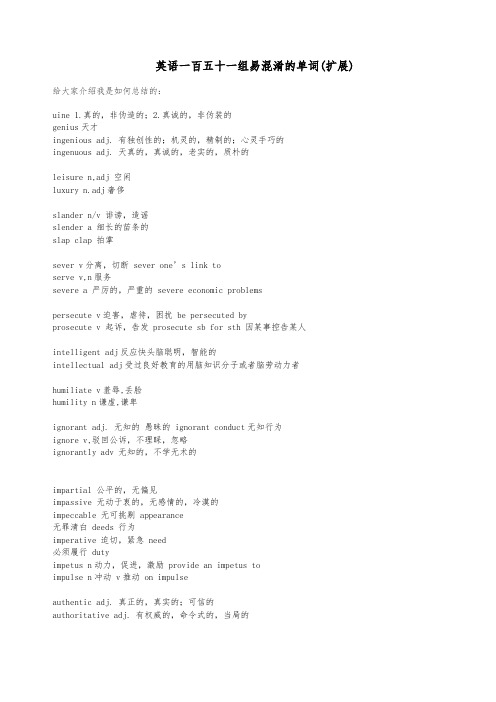
英语一百五十一组易混淆的单词(扩展)给大家介绍我是如何总结的:uine 1.真的,非伪造的;2.真诚的,非伪装的genius天才ingenious adj. 有独创性的;机灵的,精制的;心灵手巧的ingenuous adj. 天真的,真诚的,老实的,质朴的leisure n,adj 空闲luxury n.adj奢侈slander n/v 诽谤,造谣slender a 细长的苗条的slap clap 拍掌sever v分离,切断 sever one’s link toserve v,n服务severe a 严厉的,严重的 severe economic problemspersecute v迫害,虐待,困扰 be persecuted byprosecute v 起诉,告发 prosecute sb for sth 因某事控告某人intelligent adj反应快头脑聪明,智能的intellectual adj受过良好教育的用脑知识分子或者脑劳动力者humiliate v羞辱,丢脸humility n谦虚,谦卑ignorant adj. 无知的愚昧的 ignorant conduct无知行为ignore v,驳回公诉,不理睬,忽略ignorantly adv 无知的,不学无术的impartial 公平的,无偏见impassive 无动于衷的,无感情的,冷漠的impeccable 无可挑剔 appearance无罪清白 deeds 行为imperative 迫切,紧急 need必须履行 dutyimpetus n动力,促进,激励 provide an impetus toimpulse n冲动 v推动 on impulseauthentic adj. 真正的,真实的;可信的authoritative adj. 有权威的,命令式的,当局的blush vi. 脸红;感到惭愧n. 脸红;红色;羞愧vt. 红著脸表示;使成红色flush v.冲洗;(脸)发红;赶出 n.脸红 a.同高的falsh vt. 使闪光;反射n. 闪光,闪现;一瞬间vi. 闪光,闪现;反射adj. 闪光的,火速的我从学生时代至今,一直保留着做听力练习的习惯。
英语语法错误
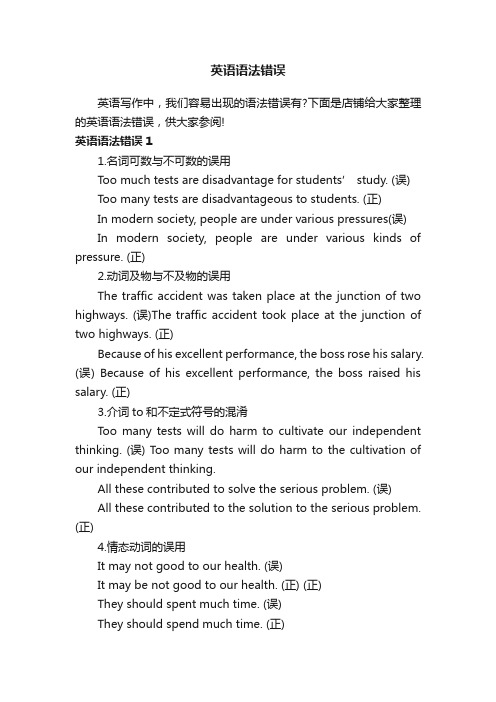
英语语法错误英语写作中,我们容易出现的语法错误有?下面是店铺给大家整理的英语语法错误,供大家参阅!英语语法错误11.名词可数与不可数的误用Too much tests are disadvantage for students’ study. (误)Too many tests are disadvantageous to students. (正)In modern society, people are under various pressures(误)In modern society, people are under various kinds of pressure. (正)2.动词及物与不及物的误用The traffic accident was taken place at the junction of two highways. (误)The traffic accident took place at the junction of two highways. (正)Because of his excellent performance, the boss rose his salary. (误) Because of his excellent performance, the boss raised his salary. (正)3.介词to和不定式符号的混淆Too many tests will do harm to cultivate our independent thinking. (误) Too many tests will do harm to the cultivation of our independent thinking.All these contributed to solve the serious problem. (误)All these contributed to the solution to the serious problem. (正)4.情态动词的误用It may not good to our health. (误)It may be not good to our health. (正) (正)They should spent much time. (误)They should spend much time. (正)英语语法错误21.句子成分残缺不全We always working till late at night before taking exams。
高考英语容易写错的单词 (共7张PPT)
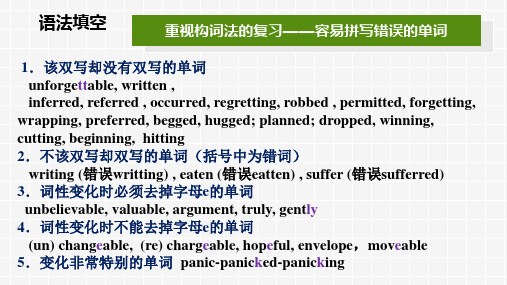
(一)容易拼写错误的单词
1. 是 or 不是er:
professor, visitor, translator, director, editor, educator, actor, inventor,
competitor, conductor ,monitor 2.容易丢掉一个字母的单词 (1)容易丢掉字母n:government,environment,environmental (2)容易丢掉不发音的字母:Christmas,Wednesday (3)拼写比较特别的单词:committee,guarantee,dilemma,
economic → economically; basic →basically; scientific → scientifically;
automatic → automatically; energetic → energetically; 但是Байду номын сангаасublic → publicly 例外
应用文
(un) changeable, (re) chargeable, hopeful, envelope,moveable 5.变化非常特别的单词 panic-panicked-panicking
语法填空
重视构词法的复习——需强化记忆的词形变化
1.动词变名词 pronounce → pronunciation , explain→ explanation, prepare → preparation combine→ combination, recommend→ recommendation , laugh→ laughter consider → consideration, recognize →recognition, occupy → occupation permit → permission, admit →admission, conclude → conclusion, decide → decision, describe → description survive → survival→ survivor, arrive → arrival, approve → approval perform → performance, apologize → apology, acquire → acquisition apply → applicant申请人→ application-申请 to one’s (satisfy/astonish/annoy/amaze/disappoint/relieve/embarrass) →satisfaction/ astonishment/annoyance /amazement / disappointment/ relief/ embarrassment) →→ “in + 上述名词”,表“处于…状态”
高考出错率最高的50组易混淆词汇,一定还有你没弄明白的!
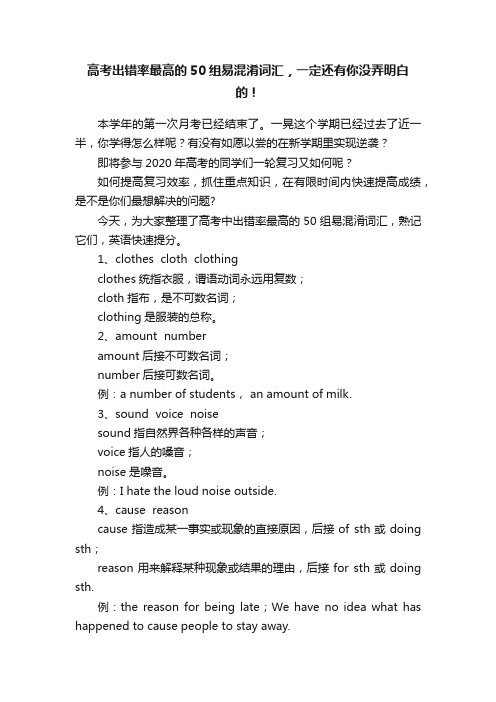
高考出错率最高的50组易混淆词汇,一定还有你没弄明白的!本学年的第一次月考已经结束了。
一晃这个学期已经过去了近一半,你学得怎么样呢?有没有如愿以尝的在新学期里实现逆袭?即将参与2020年高考的同学们一轮复习又如何呢?如何提高复习效率,抓住重点知识,在有限时间内快速提高成绩,是不是你们最想解决的问题?今天,为大家整理了高考中出错率最高的50组易混淆词汇,熟记它们,英语快速提分。
1、clothes cloth clothingclothes统指衣服,谓语动词永远用复数;cloth指布,是不可数名词;clothing是服装的总称。
2、amount numberamount后接不可数名词;number后接可数名词。
例:a number of students, an amount of milk.3、sound voice noisesound指自然界各种各样的声音;voice指人的嗓音;noise是噪音。
例:I hate the loud noise outside.4、cause reasoncause指造成某一事实或现象的直接原因,后接of sth或doing sth;reason用来解释某种现象或结果的理由,后接for sth或doing sth.例:the reason for being late;We have no idea what has happened to cause people to stay away.5、exercise exercises practiceExercise运动,锻炼(不可数);exercises练习(可数);practice(反复做的)练习。
6、work job二者均指工作,work不可数;job可数。
例:a good job.7、a number of the number ofa number of许多,谓语动词用复述;the number of……的数目,谓语动词用单数。
英语听力中易混淆词语

从三星移动设备发送在英语特别是英语听力中,单词容易错误的常见原因集中在四方面:第一,发音非常接近,甚至完全相同,容易导致在被动接受语音信息的时候(也就是听听力材料的时候)发生理解误差。
如quite 相当--quiet 安静地。
第二,有些词汇,不仅互相之间发音相似或相同,拼写也很接近,容易在练习听写的时候把单词写错。
如dairy 牛奶厂--diary 日记,以与statue 塑像--statute法令--stature身长--status 地位第三,对于一些发音特殊的词汇,考生总是记不住其正确发音,比如suite这个单词,很多考生容易把它的发音错误地理解为与suit这个单词相同,因而在听力中发生理解错误。
第四,有些单词,发音,拼写都接近,而且在含义用法上也有一些联系或雷同之处,因此在听力理解时难度极大。
如extend 延伸(时间或长度) --extent 长度以下是常见易混淆的单词1) quite 相当-- quiet 安静地2) affect v 影响, 假装-- effect n 结果,影响3) adapt 适应-- adopt 采用--adept内行4) angel 天使--angle 角度5) dairy 牛奶厂--diary 日记6) contend 奋斗, 斗争--content 内容,满足的context 上下文--contest 竞争, 比赛7) principal 校长, 主要的--principle原则8) implicit 含蓄的--explicit 明白的9) dessert 甜食--desert 沙漠v 放弃--dissert 写论文10) pat 轻拍--tap 轻打--slap 掌击-rap 敲,打11) decent 正经的--descent n 向下,血统--descend v 向下12) sweet 甜的--sweat 汗水13) later 后来-- latter 后者--latest 最近的--lately adv 最近14) costume 服装--custom 习惯15) extensive 广泛的--intensive 深刻的16) aural 耳的--oral 口头的17) abroad 国外--aboard 上(船,飞机)18) altar 祭坛--alter 改变19) assent 同意--ascent 上升--accent 口音20) champion 冠军--champagne 香槟酒-- campaign 战役21) baron 男爵--barren 不毛之地的--barn 古仓21) 更多学习内容,关注ABC微课堂22) beam 梁,光束--bean 豆--beenhave 过去式23) precede 领先--proceed 进行,继续24) pray 祈祷--prey 猎物25) chicken 鸡--kitchen 厨房26) monkey 猴子-- donkey 驴27) chore 家务活--chord 和弦-- cord细绳28) cite 引用--site 场所--sight 视觉29) clash (金属)幢击声--crash 碰幢,坠落--crush 压坏30) compliment 赞美--complement附加物31) confirm 确认--conform 使顺从32) contact 接触-- contract 合同--contrast 对照33) council 议会--counsel 忠告--consul 领事34) crow 乌鸦--crown 王冠--clown小丑--cow 牛35) dose 一剂药--doze 打盹36) drawn draw 过去分词--drown 溺水37) emigrant 移民到国--immigrant 从某国来的移民38) excess n 超过--exceed v超过--excel 擅长39) hotel 青年旅社--hostel 旅店40) latitude 纬度--altitude 高度--gratitude 感激41) immoral 不道德的--immortal 不朽的42) lone 孤独的--alone 单独的--lonely 寂寞的43) mortal 不死的--metal 金属--mental 神经的medal勋章--model模特--meddle 玩弄44) scare 惊吓--scarce 缺乏的45) drought 天旱--draught 通风, 拖拉--draughts (英)国际跳棋46) assure 保证-ensure 使确定--insure 保险47) except 除外--expect 期望--accept 接受--excerpt 选录--exempt 免除48) floor 地板--flour 面粉49) incident 事件--accident 意外50) inspiration 灵感--aspiration 渴望51) march 三月, 前进--match 比赛52) patent 专利--potent 有力的--potential 潜在的53) police 警察--policy 政策--politics政治54) protest 抗议--protect 保护55) require 需要--inquire 询问--enquire 询问--acquire 获得56) revenge 报仇--avenge 为...报仇57) story 故事--storey 楼层--store商店58) strike 打--stick 坚持-- strict 严格的59) expand 扩张--expend 花费--extend 延长60) commerce 商业--commence 开始61) through 通过--thorough 彻底的--(al)though 尽管--thought think 过去分词62) purpose 目的--suppose 假设--propose 建议63) expect 期望--respect 尊敬-- aspect 方面-- inspect 视察--suspect怀疑64) glide 滑翔--slide 使滑行--slip 跌落65) steal 偷--steel 钢65) 更多学习内容,关注ABC微课堂66) strive 努力--stride 大步走67) allusion 暗示--illusion 幻觉--delusion 错觉--elusion 逃避68) prospect 前景--perspective 透视法69) stationery 文具--stationary 固定的70) loose 松的--lose 丢失-- loss n 损失-- lost lose过去式71) amend 改正, 修正--emend 校正72) amoral unmoral immoral 同义不道德的73) capitol 大厦--capital 首都74) casual 随便的--causal 表原因的75) extend 延伸--extent 长度--extant 现存的76) inability 没能力--disability 残疾77) personnel 人事--personal 个人的78) statue 塑像--statute 法令--stature身长---status 地位79) widow 寡妇--window 窗户80) socks 短袜--stockings 长筒袜81) tax 税--taxi 出租82) definite 不定的--infinite 无限的83) grim 严酷的--grime 污点84) crayon 蜡笔--canyon 山谷85) recent 最近--resent 生气86) phrase 短语--phase 阶段87) mission 使命--emission 散发, 发射--mansion 大厦88) vision 视觉--version 译本89) gasp 上气不接下气--grasp 抓住90) delicate 微妙的--dedicate 献身91) idle 空闲的--idol 偶像92) induce 促使,劝诱--deduce 推测--reduce 减少--seduce 诱使93) lapse 流逝--elapse 消逝--eclipse日食94) rude 粗鲁的--crude 天然的95) source 水源-- sauce 酱油-- saucer 茶托-- resource 资源--recourse 求援96) sled (儿童)雪橇-- sledge 雪橇97) stripe 条纹-- strip 条-- trip 旅行98) vocation 职业--vacation 假期--evocation 召集--revocation 撤回99) ardor 热情--adore 崇拜--adorn装饰100) area 区域--era 时代101) resemble 象...--assemble v 集合,装配-- assembly n 集合, 装配102) assume 假定--resume 恢复103) attain 达到-- obtain 获得--abstain 放弃104) award 授予--reward 奖赏105) baggage (American English)luggage 行李106) badge 徽章--bandage 绷带107) blade 刀刃--bald 秃的--bold 大胆108) bloom 开花--blossom 开花(结果实)--bosom 胸口109)blush 脸红--flush 发红(脸)110) bride 新娘--bribe 贿赂111) growl 咆哮--howl 狼叫112) depress 使沮丧--suppress 镇压--oppress 压迫113) dime 一角-- dim 暗淡的114) brown 褐色--brow 眼眉--blow打击115) bullet 子弹--bulletin 公告116) carton 纸板盒--cartoon 动画117) chivalry 骑士精神--cavalry 骑兵队118) collar 领子--cellar 地窖--color 颜色119) vanish 消失--evanish 使消失120) intrude 入侵--extrude 逐出--detrude 推下121) contort 扭弯--distort 弄弯--retort 反驳122) eminent 杰出的--imminent 逼近的123) decline 下降-- recline 放置--incline 倾斜124) exclaim 呼喊proclaim 宣布--acclaim 欢呼--declaim 朗诵125) edict 法令--indict 控告126) perfuse 泼洒--profuse 浪费的127) reject 拒绝--eject 逐出--inject 注射--deject 使沮丧128) literacy 识字--literary 文学的--literature 文学--literal 文字的129) median 中央的,中线的--medium媒体130) expel 驱逐--repel 反击--impel推动--dispel 驱散131) rip 撕--ripe 熟的132) wench 绞车--wrench 扭伤133) confidant 知己--confident 有信心的134) dine 吃饭-- diner 吃饭人--dinning n 吃饭--dinner 晚饭135) dreg 渣滓--drag 拖拉136) faint 失去知觉--feint 佯攻137) imprudence 轻率--impudence无耻138) specie 硬币--species 种类139) hanger 钩子-- hangar 棚厂--hunger 饥饿140) suite 一(宾馆套房)--suit一套衣服来源:网络我们尊重原创者版权,除我们确实无法确认作者外,我们都会注明作者和来源。
细说英文单词连载四:英文单词中也有“错别字”

细说英文单词连载四:英文单词中也有“错别字”很多学生喜欢问“image”这个单词,说怎么老也记不住,2005年之前我回答不上来,因为那时候我还没有悟透一个道理:英语单词也会被错写的!今天伴随着我把“image”这个单词的正确记忆方法历史性地提出,我要告诉大家另外一个记忆英语单词的诀经——辅音错写。
我一直记得一件事,相信很多人也有类似的经历。
上小学一年级的时候,那会儿我们刚刚开始在语文课上学习一些简单的汉字,有一次课,语文老师在黑板上写下“山”、“水”、人”、“车”四个生字,大家不长时间就掌握了前面三个字,但是很多同学好几天之内还是不能准确地写出“车”字。
为什么呢?为什么我们都觉得“山”、“水”、“人”这几个字相对简单呢——因为很形象。
可是“车”字为什么不形象?难道前人造字还会偏心么,有的形象,有的不形象?我当时还只是个七岁的小孩儿,关于“车”字隐隐约约的疑问,语文老师没有具体讲,我也就没敢问。
一直到了三年级,我们换了一个语文老师——杜国琴老师,这个“车”的问题得到了解决,杜老师告诉我们:很多字原来不是这么写的,后来由于书写方便被人们改写了,每个字在最开始产生的时候都是非常形象生动、一看即懂的,像“车”字的原来的写法——也就是繁体字写法中,中间是一个“田”字,而这个“田”字正是由对生活当中车轮的形象模仿简化而来。
从那时候我就有了一个感慨:是啊,文字是生活的摹写,怎么会有不象车的“车”呢。
这种感慨也就形成了一个理想,这个理想伴随着我的整个中文学习过程,也一直延伸到了后来我对于英文单词的学习,对于英语词汇的教学。
行文至此,我要给出今天这篇文章最重要的一句话:任何文字必然要符合生活,那些不符合生活、不贴近实际的文字压根儿也不会被人们接受和传播;但是如果我们——作为后人在历史的今天的确看到了有些单词不可理解,那也不要气馁,这里面一定发生了一些小小的事故——文字被简化或者错写了!我现在就证明给大家看。
由此而言,我们今天要谈的就是:在我们手上没有充分详实的文献资料的情况下,怎样找到那些被错错写了的英文单词的本来面目呢。
英语考级易写错必背词汇

单词拼写必背一、一个星期七天1. Monday2. Tuesday3. Wednesday4. Thursday5. Friday6. Saturday7. Sunday二、一年十二个月1. January2. February3. March4. April5. May6. June7. July8. August9. September10. October11. November 12. December三、一年四季1. spring2. summer3. autumn4. winter四、容易拼写错的数字1.eighth第八2.ninth第九3.forty四十4.twelfth第十二5.twentieth第二十五、亲属称呼1.daughter (女儿)2.niece (女性晚辈)3.nephew (男性晚辈)4.cousin (同辈兄弟姐妹)5.aunt (女性长辈)6.uncle (男性长辈)六、以下动词加-ed或-ing要双写最后一个字母1.regret (regretted, regretting)后悔2.control (controlled,controlling) 控制3.admit (admitted, admitting)承认4.occur (occurred, occurring)出现5.prefer (preferred,preferring) 宁愿6.refer (referred, referring)提到7.forget (forgetting ) 忘记8.permit (permitted,permitting)允许9.equip (equipped, equipping)装备注意:quarrel, signal, travel中的l可双写(英国英语)也可不双写(美国英语)七、部分过去式和过去分词不规则变化的动词1.broadcast (broadcast,broadcast) 广播2.flee (fled, fled) 逃跑3.forbid (forbade, forbidden)禁止4.forgive (forgave, forgiven)原谅5.freeze (froze, frozen) 结冰6.hang (作―绞死‖讲,是规则的;作―悬挂‖讲,其过去式过去分词都是hung) 7.lie (作―说谎‖讲时,是规则的;作―位于‖讲时,其过去式是lay,过去分词是lain)8.seek (sought, sought) 寻求9.shake (shook, shaken) 发抖10.s ing (sang, sung) 唱歌11.s ink (sank, sunk/sunken)下沉12.s pread (spread, spread) 传播13.s wim (swam, swum) 游泳14.t ear (tore, torn) 撕碎15.w eave (wove, woven) 编织八、注意形容词变名词时的拼写变化1.long—length 长度2.wide—width 宽度3.high—height 高度4.strong—strength力量九、以-ic结尾的动词,应先把-ic变为-ick,再加ing或ed1.picnic (picnicked, picnicking) 野餐十、个别名词的复数拼写1.German (Germans) 德国人2.gulf (gulfs) 海湾3.handkerchief(handkerchiefs) 手帕4.hero (英雄),potato (土豆),tomato (西红柿) 等有生命的以-o结尾的名词变复数时要加-es。
英语作文易错词

英语作文易错词Sure, I can help you with that!In English writing, there are several commonly confused words that can trip up even the most proficient writers. Here's a list of some frequently mistaken words along with explanations to help you use them correctly:1. Affect vs. Effect:"Affect" is usually a verb meaning to influence or produce a change in something. Example: The weather can affect my mood."Effect" is usually a noun meaning the result or outcome of something. Example: The new policy had a significant effect on the company's profits.2. Their vs. They're vs. There:"Their" is a possessive pronoun indicating ownership by a group. Example: Their house is beautiful."They're" is a contraction of "they are." Example: They're going to the party tonight."There" indicates a place or position. Example: The book is over there on the table.3. Your vs. You're:"Your" is a possessive pronoun indicating ownership by the person you are addressing. Example: Is this your book?"You're" is a contraction of "you are." Example: You're going to love this movie.4. Its vs. It's:"Its" is a possessive pronoun indicating ownership by a thing or non-human entity. Example: The dog wagged itstail."It's" is a contraction of "it is" or "it has." Example: It's raining outside.5. Then vs. Than:"Then" is often used to indicate a time or sequence of events. Example: We went to dinner, and then we saw a movie."Than" is used to make comparisons. Example: She is taller than her brother.6. To vs. Too vs. Two:"To" is a preposition indicating direction or intention. Example: I'm going to the store."Too" means also or excessively. Example: I want to go too."Two" is the number 2. Example: She has two cats.7. Who vs. Whom:"Who" is used as a subject pronoun. Example: Who isat the door?"Whom" is used as an object pronoun. Example: To whom did you give the letter?8. Accept vs. Except:"Accept" is a verb meaning to receive or agree to something. Example: She accepted the job offer."Except" is a preposition meaning excluding or apart from. Example: Everyone is going to the party except me.9. Loose vs. Lose:"Loose" is an adjective meaning not tight or relaxed. Example: These pants are too loose."Lose" is a verb meaning to misplace or fail to win. Example: Don't lose your keys.10. Advice vs. Advise:"Advice" is a noun meaning guidance or recommendations. Example: She gave me some good advice."Advise" is a verb meaning to give advice. Example: I advise you to study hard for the exam.By paying close attention to these commonly confused words and their correct usage, you can enhance the clarity and effectiveness of your writing. Practice using them in sentences to reinforce your understanding and improve your writing skills.。
英语作文写错单词

英语作文写错单词Title: Embracing Imperfection: The Beauty of Misspelled Words。
In a world where perfection is often glorified, I dare to celebrate imperfection. Yes, you read that right. Imperfection, especially in the form of misspelled words, holds a unique charm that is often overlooked. Join me on this journey as we explore the beauty and significance of words gone slightly awry.Firstly, let's debunk the myth that spelling errors equate to incompetence or ignorance. On the contrary, they often signify bravery in expression. When someone writes passionately, their mind races ahead of their fingers, leaving a trail of misspelled words in its wake. These errors are not failures but rather symbols of creativity and enthusiasm.Furthermore, misspelled words possess a certainauthenticity that polished writing lacks. They reveal the human element behind the text, reminding us that languageis a living, breathing entity shaped by our individual experiences and quirks. Just as no two fingerprints are alike, no two individuals spell every word flawlessly. Embracing these imperfections fosters a deeper connection between writer and reader, forging bonds based on empathy rather than perfectionism.Consider the humble typo, often dismissed as a nuisance. While it may seem insignificant, a typo can alter theentire tone or meaning of a sentence, sometimes with humorous results. Who hasn't chuckled at a menu offering "freshly baked children" instead of "freshly baked chicken"? These slip-ups inject levity into our lives, serving as gentle reminders not to take ourselves too seriously.Moreover, misspelled words challenge us to thinkoutside the box and embrace ambiguity. When confronted with a word we cannot decipher, we are forced to engage our cognitive faculties, drawing upon context clues andintuition to decipher its intended meaning. This processcultivates resilience and adaptability, skills that are invaluable in an ever-changing world.Let us also recognize the democratizing effect of misspelled words. In a society where language elitism runs rampant, errors level the playing field, granting equal voice to all. Whether you are a seasoned wordsmith or a novice writer, your ideas carry weight regardless of spelling proficiency. By embracing misspellings, we dismantle linguistic hierarchies and foster a moreinclusive discourse.Of course, this is not to say that spelling is unimportant. Clear communication relies on accurate spelling, and egregious errors can hinder comprehension. However, we must learn to distinguish between genuine mistakes and harmless deviations. Rather than admonishing individuals for their misspellings, let us celebrate the courage it takes to put pen to paper (or fingers to keyboard) in the first place.In conclusion, misspelled words are not blemishes to beerased but rather strokes of color that enrich the tapestry of language. They remind us of our shared humanity, our propensity for error, and our capacity for growth. So let us embrace imperfection in all its forms, for therein lies the true beauty of language. After all, as William Shakespeare once wrote, "To err is human, to forgive divine."In this spirit, I invite you to revel in your own linguistic blunders, to cherish them as badges of authenticity and sources of inspiration. For in the realm of language, perfection is but an illusion, but the beauty of imperfection is everlasting.。
英语作文人称写错
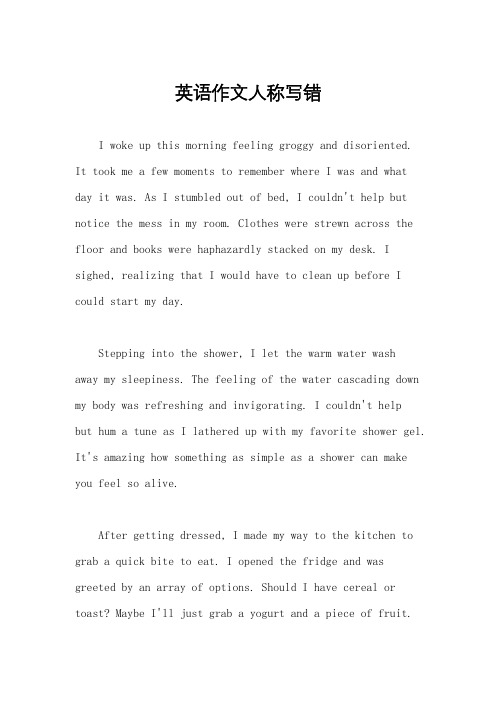
英语作文人称写错I woke up this morning feeling groggy and disoriented.It took me a few moments to remember where I was and what day it was. As I stumbled out of bed, I couldn't help but notice the mess in my room. Clothes were strewn across the floor and books were haphazardly stacked on my desk. I sighed, realizing that I would have to clean up before I could start my day.Stepping into the shower, I let the warm water wash away my sleepiness. The feeling of the water cascading down my body was refreshing and invigorating. I couldn't helpbut hum a tune as I lathered up with my favorite shower gel. It's amazing how something as simple as a shower can make you feel so alive.After getting dressed, I made my way to the kitchen to grab a quick bite to eat. I opened the fridge and was greeted by an array of options. Should I have cereal or toast? Maybe I'll just grab a yogurt and a piece of fruit.Decisions, decisions. Breakfast may be the most important meal of the day, but it's also the most difficult one for me to decide on.With breakfast in hand, I settled down at my desk to start my work. The hum of the computer filled the room as I clicked away on the keyboard. Emails, spreadsheets, and reports filled my screen, demanding my attention. It's amazing how quickly time flies when you're engrossed in your work.As the day went on, I found myself growing restless. The walls of my office seemed to close in on me,suffocating me with their monotony. I needed a break, a breath of fresh air. So I grabbed my coat and headed outside. The cool breeze brushed against my face, instantly rejuvenating my spirit. I took a deep breath, letting the crisp air fill my lungs. It's amazing how a simple walk can clear your mind and give you a new perspective.Back at my desk, I continued to work, but my mind kept wandering. Thoughts of the weekend plans and upcomingevents filled my head, distracting me from the task at hand.I tried to focus, but my mind had a mind of its own. It's amazing how easily we can get lost in our thoughts, even when we have important things to do.Finally, the workday came to an end. I shut down my computer and packed up my things, ready to head home. As I walked out of the office, I couldn't help but feel a senseof relief. The day had been long and challenging, but I had made it through. It's amazing how a little perseverance can get you through even the toughest of days.Arriving home, I kicked off my shoes and collapsed onto the couch. The exhaustion of the day washed over me, and I couldn't help but smile. It had been a rollercoaster of a day, filled with ups and downs, but I had made it. It's amazing how a single day can hold so many emotions and experiences.。
英语作文里表达“动作”的基本词,写错低分,高考和考研作文都可以看
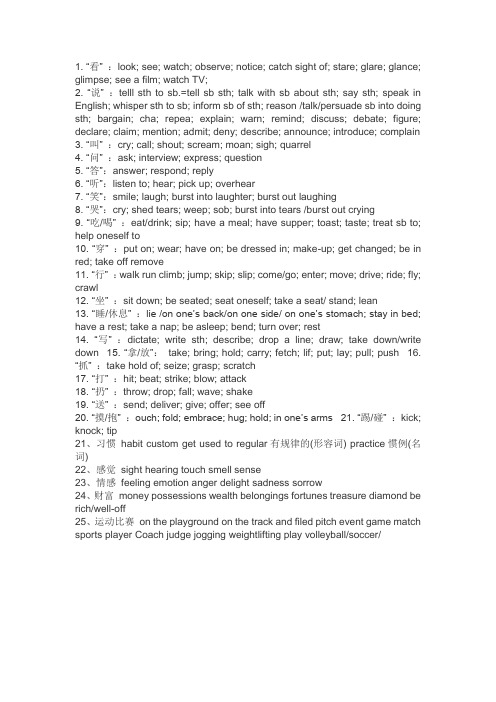
1. “看” :look; see; watch; observe; notice; catch sight of; stare; glare; glance; glimpse; see a film; watch TV;2. “说” :telll sth to sb.=tell sb sth; talk with sb about sth; say sth; speak in English; whisper sth to sb; inform sb of sth; reason /talk/persuade sb into doing sth; bargain; cha; repea; explain; warn; remind; discuss; debate; figure; declare; claim; mention; admit; deny; describe; announce; introduce; complain3. “叫” :cry; call; shout; scream; moan; sigh; quarrel4. “问” :ask; interview; express; question5. “答”:answer; respond; reply6. “听”:listen to; hear; pick up; overhear7. “笑”:smile; laugh; burst into laughter; burst out laughing8. “哭”:cry; shed tears; weep; sob; burst into tears /burst out crying9. “吃/喝” :eat/drink; sip; have a meal; have supper; toast; taste; treat sb to; help oneself to10. “穿” :put on; wear; have on; be dressed in; make-up; get changed; be in red; take off remove11. “行” :walk run climb; jump; skip; slip; come/go; enter; move; drive; ride; fly; crawl12. “坐” :sit down; be seated; seat oneself; take a seat/ stand; lean13. “睡/休息” :lie /on one’s back/on one side/ on one’s stomach; stay in bed; have a rest; take a nap; be asleep; bend; turn over; rest14. “写” :dictate; write sth; describe; drop a line; draw; take down/write down 15. “拿/放”:take; bring; hold; carry; fetch; lif; put; lay; pull; push 16. “抓” :take hold of; seize; grasp; scratch17. “打” :hit; beat; strike; blow; attack18. “扔” :throw; drop; fall; wave; shake19. “送” :send; deliver; give; offer; see off20. “摸/抱” :ouch; fold; embrace; hug; hold; in one’s arms 21. “踢/碰” :kick; knock; tip21、习惯habit custom get used to regular有规律的(形容词) practice惯例(名词)22、感觉sight hearing touch smell sense23、情感feeling emotion anger delight sadness sorrow24、财富money possessions wealth belongings fortunes treasure diamond be rich/well-off25、运动比赛on the playground on the track and filed pitch event game match sports player Coach judge jogging weightlifting play volleyball/soccer/。
高中英语作文中易写错的句子,月考必备!
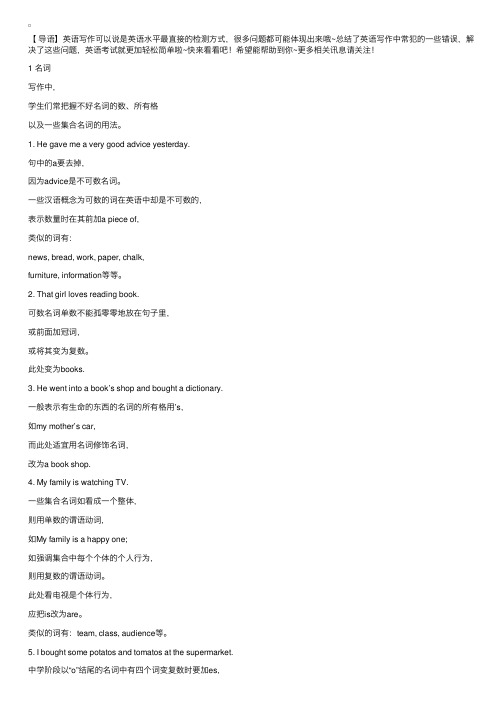
【导语】英语写作可以说是英语⽔平最直接的检测⽅式,很多问题都可能体现出来哦~总结了英语写作中常犯的⼀些错误,解决了这些问题,英语考试就更加轻松简单啦~快来看看吧!希望能帮助到你~更多相关讯息请关注!1 名词写作中,学⽣们常把握不好名词的数、所有格以及⼀些集合名词的⽤法。
1. He gave me a very good advice yesterday.句中的a要去掉,因为advice是不可数名词。
⼀些汉语概念为可数的词在英语中却是不可数的,表⽰数量时在其前加a piece of,类似的词有:news, bread, work, paper, chalk,furniture, information等等。
2. That girl loves reading book.可数名词单数不能孤零零地放在句⼦⾥,或前⾯加冠词,或将其变为复数。
此处变为books.3. He went into a book’s shop and bought a dictionary.⼀般表⽰有⽣命的东西的名词的所有格⽤’s,如my mother’s car,⽽此处适宜⽤名词修饰名词,改为a book shop.4. My family is watching TV.⼀些集合名词如看成⼀个整体,则⽤单数的谓语动词,如My family is a happy one;如强调集合中每个个体的个⼈⾏为,则⽤复数的谓语动词。
此处看电视是个体⾏为,应把is改为are。
类似的词有:team, class, audience等。
5. I bought some potatos and tomatos at the supermarket.中学阶段以“o”结尾的名词中有四个词变复数时要加es,它们是tomato, potato, Negro, hero;其余的都加s变为复数。
6. This has nothing to do with their believes.(这和他们的信仰没关系。
- 1、下载文档前请自行甄别文档内容的完整性,平台不提供额外的编辑、内容补充、找答案等附加服务。
- 2、"仅部分预览"的文档,不可在线预览部分如存在完整性等问题,可反馈申请退款(可完整预览的文档不适用该条件!)。
- 3、如文档侵犯您的权益,请联系客服反馈,我们会尽快为您处理(人工客服工作时间:9:00-18:30)。
1.日常用语类
lover 情人(不是“爱人”)
busboy 餐馆勤杂工(不是“公汽售票员”)
busybody 爱管闲事的人(不是“大忙人”)
dry goods (美)纺织品;(英)谷物(不是“干货”)
heartman 做心脏移植手术的人(不是“有心人”)
mad doctor 精神病科医生(不是“发疯的医生”)
eleventh hour 最后时刻(不是“十一点”)
blind date (由第三者安排的)男女初次会面(并非“盲目约会”或“瞎约会”)dead president 美钞(上印有总统头像)(并非“死了的总统”)
personal remark 人身攻击(不是“个人评论”)
sweet water 淡水(不是“糖水”)
confidence man 骗子(不是“信得过的人”)
criminal lawyer 刑事律师(不是“犯罪的律师”)
service station 加油站
rest room 厕所(不是“休息室”)
dressing room 化妆室(不是“试衣室”或“更衣室”)
sporting house 妓院(不是“体育室”)
horse sense 常识(不是“马的感觉”)
capital idea 好主意(不是“资本主义思想”)
familiar talk 庸俗的交谈(不是“熟悉的谈话”)
black tea 红茶(不是“黑茶”)
black art 妖术(不是“黑色艺术”)
black stranger 完全陌生的人(不是“陌生的黑人”)
white coal (作动力来源用的)水
white man 忠实可靠的人(不是“皮肤白的人”)
yellow book 黄皮书(法国政府报告书,以黄纸为封)(不是“黄色书籍”)red tape 官僚习气(不是“红色带子”)
green hand 新手(不是“绿手”)
blue stocking 女学者、女才子(不是“蓝色长统袜”)
China policy 对华政策(不是“中国政策”)
Chinese dragon 麒麟(不是“中国龙”)
American beauty 红蔷薇(不是“美国美女”)
English disease 气管炎(不是“英国病”)
Indian summer 愉快宁静的晚年(不是“印度的夏日”)
Greek gift 害人的礼品(不是“希腊礼物”)
Spanish athlete 吹牛的人(不是“西班牙运动员”)
French chalk 滑石粉(不是“法国粉笔”)
2.成语类
pull one's leg 开玩笑(不是“拉后腿”)
in one's birthday suit 赤身裸体(不是“穿着生日礼服”)
eat one's words 收回前言(不是“吃话”)
an apple of love 西红柿(不是“爱情之果”)
handwriting on the wall 不祥之兆(不是“大字报”)
bring down the house 博得全场喝彩(不是“推倒房子”)
have a fit 勃然大怒(不是“试穿”)
make one's hair stand on end 令人毛骨悚然—恐惧(不是“令人发指——气愤”)
be taken in 受骗,上当(不是“被接纳”)
think a great deal of oneself 高看或看重自己(不是“为自己想得很多”)pull up one's socks 鼓起勇气(不是“提上袜子”)
have the heart to do (用于否定句)忍心做……不是“有心做”或“有意做”)
3.表达方式类
Look out! 当心!(不是“向外看”)
What a shame! 多可惜!真遗憾!(不是“多可耻”)
You don't say! 是吗!(不是“你别说”)
You can say that again! 说得好!(不是“你可以再说一遍”)
I haven't slept better. 我睡得好极了。
(不是“我从未睡过好觉”)
You can't be too careful in your work. 你工作越仔细越好。
(不是“你工作不能太仔细”)
It has been 4 years since I smoked. 我戒烟4年了。
(不是“我抽烟4年了”)All his friends did not turn up. 他的朋友没全到。
(不是“他的朋友全没到”)
People will be long forgetting her. 人们在很长时间内会记住她的。
(不是“人们会永远忘记她”)
He was only too pleased to let them go. 他很乐意让他们走。
(不是“他太高兴了,不愿让他们走”)
It can't be less interesting. 它无聊极了。
(不是“它不可能没有趣”)。
